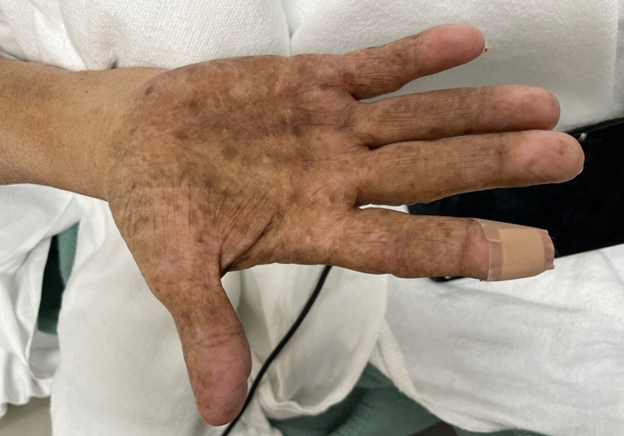Sunday Poster Session
Category: Colon
P0330 - Cronkhite-Canada Syndrome: A Rare Case of Gastrointestinal Polyposis
Sunday, October 26, 2025
3:30 PM - 7:00 PM PDT
Location: Exhibit Hall

Pooja Mallipaddi, DO
University of Oklahoma School of Community Medicine
Tulsa, OK
Presenting Author(s)
Pooja Mallipaddi, DO1, David Meehan, DO2, Febin John, MD2
1University of Oklahoma School of Community Medicine, Tulsa, OK; 2Saint Francis Health Systems, Tulsa, OK
Introduction: Cronkhite-Canada Syndrome (CCS) is an extremely rare, non-hereditary gastrointestinal polyposis syndrome characterized by diffuse GI hamartomatous polyps, chronic diarrhea, protein-losing enteropathy, and ectodermal abnormalities including alopecia, hyperpigmentation, and nail dystrophy. Fewer than 500 cases have been reported globally. Its pathogenesis is poorly understood. It is hypothesized to involve immune dysregulation. The rarity and clinical overlap with other GI and autoimmune diseases make early diagnosis and treatment challenging. We present a case of CCS in an elderly female to highlight its clinical presentation, pathophysiology, differential diagnosis, and management strategies.
Case Description/
Methods: The patient is a 67-year-old female with a medical history of hypertension, type 2 diabetes, hypothyroidism, celiac disease, and recurrent Clostridioides difficile infections, presented with a three-day history of worsening nausea, vomiting, profuse diarrhea, and generalized abdominal pain. She reported a 100-pound weight loss over 2–3 years despite strict adherence to a gluten-free diet. Additional findings included alopecia and hyperpigmentation of the hands and feet.
Laboratory studies revealed hypoalbuminemia, iron deficiency anemia, and electrolyte abnormalities. CT abdomen and pelvis with contrast showed severe colitis and ileitis with pseudopolypoid lesions scattered throughout the colon. EGD and colonoscopy revealed diffuse semi-pedunculated polyps in the entire GI tract, sparing only the esophagus. Pathology revealed juvenile-type hamartomatous polyp fragments, consistent with CCS. She is treated with azathioprine and total parenteral nutrition.
Discussion: CCS is a diagnosis of exclusion that mimics other polyposis syndromes such as Peutz-Jeghers, juvenile polyposis, and Cowden syndrome. It is diagnosed based on clinical and endoscopic findings. Management includes nutritional support, immunosuppressants, and close surveillance for malignancy. This case aims to highlight the distinguishing features of CCS from other GI polyposis syndromes to support earlier diagnosis and treatment.

Figure: Hyperpigmentation of the palmer aspect of the hand
Disclosures:
Pooja Mallipaddi indicated no relevant financial relationships.
David Meehan indicated no relevant financial relationships.
Febin John indicated no relevant financial relationships.
Pooja Mallipaddi, DO1, David Meehan, DO2, Febin John, MD2. P0330 - Cronkhite-Canada Syndrome: A Rare Case of Gastrointestinal Polyposis, ACG 2025 Annual Scientific Meeting Abstracts. Phoenix, AZ: American College of Gastroenterology.
1University of Oklahoma School of Community Medicine, Tulsa, OK; 2Saint Francis Health Systems, Tulsa, OK
Introduction: Cronkhite-Canada Syndrome (CCS) is an extremely rare, non-hereditary gastrointestinal polyposis syndrome characterized by diffuse GI hamartomatous polyps, chronic diarrhea, protein-losing enteropathy, and ectodermal abnormalities including alopecia, hyperpigmentation, and nail dystrophy. Fewer than 500 cases have been reported globally. Its pathogenesis is poorly understood. It is hypothesized to involve immune dysregulation. The rarity and clinical overlap with other GI and autoimmune diseases make early diagnosis and treatment challenging. We present a case of CCS in an elderly female to highlight its clinical presentation, pathophysiology, differential diagnosis, and management strategies.
Case Description/
Methods: The patient is a 67-year-old female with a medical history of hypertension, type 2 diabetes, hypothyroidism, celiac disease, and recurrent Clostridioides difficile infections, presented with a three-day history of worsening nausea, vomiting, profuse diarrhea, and generalized abdominal pain. She reported a 100-pound weight loss over 2–3 years despite strict adherence to a gluten-free diet. Additional findings included alopecia and hyperpigmentation of the hands and feet.
Laboratory studies revealed hypoalbuminemia, iron deficiency anemia, and electrolyte abnormalities. CT abdomen and pelvis with contrast showed severe colitis and ileitis with pseudopolypoid lesions scattered throughout the colon. EGD and colonoscopy revealed diffuse semi-pedunculated polyps in the entire GI tract, sparing only the esophagus. Pathology revealed juvenile-type hamartomatous polyp fragments, consistent with CCS. She is treated with azathioprine and total parenteral nutrition.
Discussion: CCS is a diagnosis of exclusion that mimics other polyposis syndromes such as Peutz-Jeghers, juvenile polyposis, and Cowden syndrome. It is diagnosed based on clinical and endoscopic findings. Management includes nutritional support, immunosuppressants, and close surveillance for malignancy. This case aims to highlight the distinguishing features of CCS from other GI polyposis syndromes to support earlier diagnosis and treatment.

Figure: Hyperpigmentation of the palmer aspect of the hand
Disclosures:
Pooja Mallipaddi indicated no relevant financial relationships.
David Meehan indicated no relevant financial relationships.
Febin John indicated no relevant financial relationships.
Pooja Mallipaddi, DO1, David Meehan, DO2, Febin John, MD2. P0330 - Cronkhite-Canada Syndrome: A Rare Case of Gastrointestinal Polyposis, ACG 2025 Annual Scientific Meeting Abstracts. Phoenix, AZ: American College of Gastroenterology.
